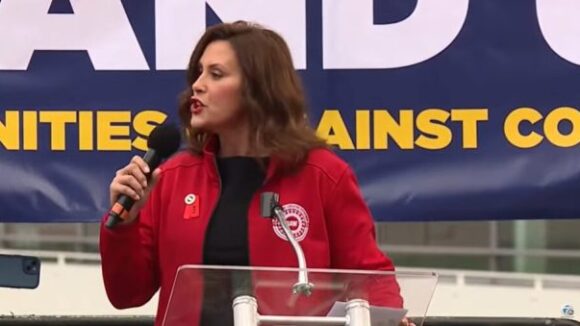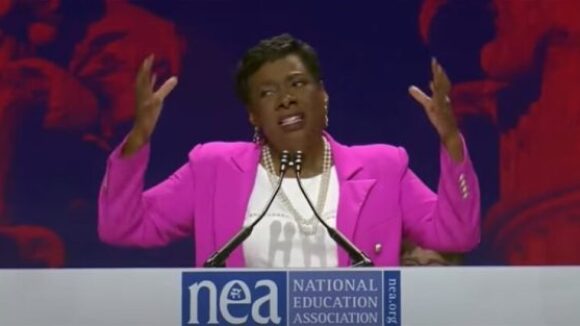Tyranny Triumphs in the Great Lakes State
Ignoring ample evidence of forced unionism’s unfairness and its damaging impact on jobs and incomes, Big Labor Michigan Gov. Gretchen Whitmer signed Right to Work destruction in 2023.
High Court Seems Poised to Bar Public-Sector Forced Dues, Fees
(Click here to download the February 2016 National Right to Work Newsletter)
Nearly four decades ago, the U.S. Supreme Court adopted a strained and constricted interpretation of the First Amendment in order to give a constitutional nod to statutes authorizing the termination of public servants for refusal to bankroll an unwanted union.
But now a High Court majority seems ready to change course.
At last month’s hearing in Friedrichs v. California Teachers Association, a case challenging forced financial support for government unions on First Amendment grounds, four justices sent clear signals that they are inclined to rule with the plaintiffs.
A fifth justice, George H.W. Bush appointee Clarence Thomas, followed his usual practice of keeping silent during oral arguments.
However, based on his track record over the past quarter century at the High Court, it is reasonable to guess he will vote to bar public-sector forced dues and fees.
Right to Work’s Knox and Harris Wins ‘Encouraged’ Friedrichs Litigants
Friedrichs is based largely on precedents argued and won by National Right to Work Legal Defense Foundation attorneys on behalf of employee clients. In an interview published January 8, the head of the Center for Individual Rights (CIR), which worked together with independent-minded California teachers to bring the Friedrichs case together, specifically credited two Foundation precedents for paving the way.
Knox v. SEIU Local 1000, a case argued and won in 2012 by Right to Work attorneys on behalf of nonmembers of the Service Employees International Union who objected to loaning money to its political machine, “made it easier and more timely to bring” the Friedrichs case forward, said CIR President Terry Pell.
And the 2014 Right to Work victory on behalf of Illinois home health caregivers in Harris v. Quinn gave Mr. Pell and his associates “further encouragement,” according to interviewer Tierney Sneed.
‘The Union Basically Is Making These Teachers Compelled Riders . . .’
As the Friedrichs respondents’ counsels of record stood before the High Court on January 11, Chief Justice John Roberts and Associate Justices Sam Alito, Antonin Scalia, and Anthony Kennedy peppered them with questions about whether the 1977 Abood v. Detroit Board of Education case had been rightly decided.
Writing for the Abood court 39 years ago, Justice Potter Stewart admitted forcing public employees who don’t want a union to bankroll union bargaining activities “interferes” with their First Amendment rights, but contended that such interference is acceptable since it is deemed to promote “labor peace.”
Justice Kennedy wondered aloud if this government interest could even potentially have sufficient weight to justify systematic and preemptive interference with the First Amendment rights of a whole class of employees:
“I suppose . . . we could assume that a State is always benefitted and . . . is more efficient if it can suppress speech.”
Justice Kennedy was also highly skeptical of the respondents’ claim that forcing public employees to bankroll bargaining-related speech with which they disagree as a job condition is acceptable as long as the employees remain free in some forums to speak out against union bosses’ positions:
“It’s odd to say that if X is required to pay $500 for someone to espouse a belief that he doesn’t share, that he is now free to go out and . . . argue against it. That means he has to spend another $500 so it balances out? That makes no sense.”
And when respondent lawyer Edward DuMont denigrated educators who don’t want to bankroll an unwanted union as “free riders,” Justice Kennedy sharply retorted:
“The union basically is making these teachers compelled riders for issues on which they strongly disagree.”
‘[Q]uite Frankly, It’s Not Fair to the Ones Who Work Hard’
Mark Mix, president of the National Right to Work Committee as well as the National Right to Work Foundation, said that the Friedrichs ruling, expected in roughly four months, could well represent a major step forward for Right to Work supporters.
But even if the best-case scenario unfolds and the High Court issues a strong opinion in favor of the plaintiffs, he cautioned, Right to Work supporters will still have work to do before the bitter struggle against coercive unionism is finally won.
Mr. Mix explained: “Today there are over 5 million unionized state and local public servants employed in states that currently lack Right to Work protections in the government sector.
“Many if not most of these public employees have good reason to believe that being subject to union monopoly control is a detriment for them.
“For example, Rebecca Friedrichs, the southern California third-grade teacher who is the lead plaintiff in Friedrichs, has singled out rigid, Big Labor-favored ‘salary schedules’ that base educator pay exclusively on paper credentials and seniority as something that ‘doesn’t make any sense.’
“As a consequence of the salary schedules, as Ms. Friedrichs noted, ‘a teacher who just kind of shows up and goes through the motions gets paid the same’ as a far superior teacher with the same seniority and ‘the same number of [education] units. . . . [Q]uite frankly it’s not fair to the ones who work hard.’”
Union Czarina: Ending Public-Sector Forced Dues Could Cost Big Labor Two Million Members
“No one can predict with any precision how many of the public servants who are now paying forced dues or fees for harmful union ‘representation’ will take advantage of their restored freedom to cut off financial support for union bosses if the Supreme Court reverses Abood,” acknowledged Mr. Mix.
“But unless Big Labor responds to a pro-First Amendment decision by reforming and serving the needs of ordinary rank-and-file unionized employees better, it stands to lose more than a billion dollars a year.”
Mr. Mix pointed out that, while speaking with former Obama strategist David Axelrod in a January 7 podcast, Service Employees International Union czarina Mary Kay Henry predicted that Big Labor could quickly lose “two million” members once Friedrichs is resolved.
Why would workers begin acting in droves to withdraw their financial support from Organized Labor once the Supreme Court allowed them to?
Ms. Henry was blunt in her assessment. Several decades ago, “[w]e ceased to be relevant to ordinary people.”
Mr. Mix cautioned: “As significant a victory as Friedrichs could be for freedom-loving Americans, one shouldn’t overstate its potential impact.”
Monopoly-Bargaining Privileges Won’t Be Affected at All
“The most important limitation,” Mr. Mix continued, “is that Friedrichs doesn’t even challenge labor-law provisions forcing public employees to accept the officers of one union as their monopoly-bargaining agents on workplace matters, including pay, benefits, and work rules.
“The reality is, even in jurisdictions with Right to Work protections, union officials routinely use their monopoly-bargaining privileges like a cattle prod to herd more workers under their control, and punish those who resist.
The late union lawyer Thomas Harris, who served for several years as the AFL-CIO’s associate general counsel, vividly expressed the value of monopoly bargaining for Big Labor, even absent forced-dues privileges, in a published speech:
“The fact that the union will negotiate the contract which regulates the incidents of [a worker’s] industrial life puts him under powerful compulsion to join the union . . . .”
A second important limitation of Friedrichs that Right to Work supporters need to remember is that it will likely have no effect on Big Labor’s special privileges in the private sector.
“The 5.6 million unionized private-sector employees who work in states that don’t protect the freedom to hold a job without joining and/or bankrolling a union probably won’t see any change in their circumstances, no matter how Friedrichs turns out,” said Mr. Mix.
“National Right to Work Committee members and supporters will be very happy if the High Court partially restores the free choice of state and local government workers, but won’t be satisfied until full free choice for workers is restored.”

Ignoring ample evidence of forced unionism’s unfairness and its damaging impact on jobs and incomes, Big Labor Michigan Gov. Gretchen Whitmer signed Right to Work destruction in 2023.

Largely thanks to the Right to Work attorney-won U.S. Supreme Court decision in Janus v. AFSCME, union bosses like NEA President Becky Pringle are no longer able to block virtually all meaningful education policy reforms.

Avelo employee Kim Howard believes all the firm’s flight attendants should get to vote on continued AFA rule. Credit: WTNH-TV (ABC,…